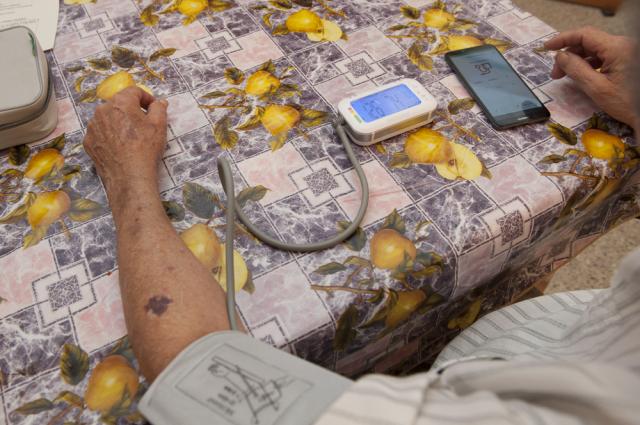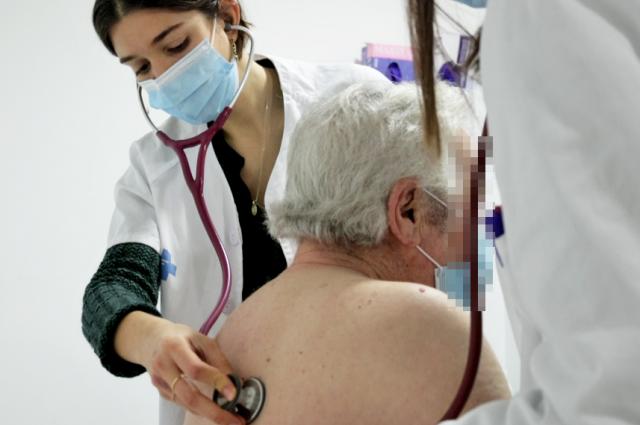A study conducted by healthcare professionals from the Territorial Programme of Integrated Care for Patients with Community Heart Failure at the Southern Metropolitan Territorial Management of the ICS has revealed that this programme not only successfully reduces readmissions and patient mortality rates within 30 days after discharge, as previously demonstrated, but also at the 90 and 180-day marks.
This research was conducted as part of the Cardiovascular Diseases Research Group (BIOHEART) at IDIBELL, focusing on applied research in health outcomes. The findings have been published in the scientific journal PLOS ONE.
The study compared the progress of 123 patients who were discharged between January and August 2017, just before the programme's launch, with 317 patients discharged between September 2017 and January 2019, by which time the programme was well-established. This study specifically selected patients at the highest risk of relapse.
Analysis of the data showed that the combined rate of readmissions and deaths was significantly better in the second group of patients than in the first, both at 90 and 180 days. A reduction in adverse events, hospitalisations for heart failure and cardiovascular disease, as well all-cause mortality was detected in the second group.
The Community Heart Failure Programme team is made up of doctors and nurses from the Multidisciplinary Unit for Community Heart Failure Care (UMICO) at Bellvitge University Hospital and the Primary Care Units of Hospitalet Sud, Hospitalet Centre and El Prat de Llobregat. Its daily activity is led and developed by nursing professionals.
The programme is centred on improving access to care, maintaining continuity of care, optimising treatment, and providing patient education. It commences with a comprehensive psychosocial and clinical assessment of the patient to determine an individualised follow-up plan. Subsequently, a seven-step protocol is implemented, which involves a holistic and intensive intervention lasting 3 to 6 months. This intervention includes a combination of in-person visits and remote contacts (via telephone and videoconference). Its primary objectives are patient education and empowerment in self-care, the prescription of pharmacological and non-pharmacological treatments following clinical practice guidelines, conducting in-depth investigations into the causes of heart failure when necessary, and early identification and treatment of comorbidities and decompensation.
The patient's follow-up period can be extended if the predefined objectives have not been met within the initially set timeframe. Nurses who are responsible for implementing the protocol have access to various support tools, allowing them to manage their interventions autonomously, with the option of seeking assistance from doctors if necessary.
Heart failure is a chronic syndrome with a significantly adverse impact on mortality, morbidity, and quality of life within the population. It stands as one of the primary causes of hospital readmissions, particularly in the weeks and months immediately following the initial hospital discharge.
According to Dr Josep Comín, head of the Cardiology Service at Bellvitge Hospital, promoter of this programme and director of the Cardiovascular Disease Research Group (BIOHEART) of IDIBELL, the results of this study "are relevant because they confirm the potential benefits of community programmes beyond the thirty-day barrier". In his view, these results “give more
reasons for these programmes to be applied widely, so that optimal care can be offered to patients in their most vulnerable phase, which is just after hospital discharge.”
Reference article
Lidia Alcoberro, Pedro Moliner, Joan Vime, Santiago Jiménez-Marrero, Alberto Garay, Sergi Yun, Alexandra Pons-Riverola, Raúl Ramos-Polo, Mar Ras-Jiménez, Marta Tajes, Encarna Hidalgo, Esther Calero, Marta Ruiz, Nuria José-Bazán, Carles Ferre, Cristina Delso, Laia Alcober, Cristina Enjuanes, Josep Comin-Colet. Breaking the 30-day barrier: Long-term effectiveness of a nurse-led 7-step transitional intervention program in heart failure. PLOS ONE. Published: February 7, 2023 https://doi.org/10.1371/journal.pone.0279815

